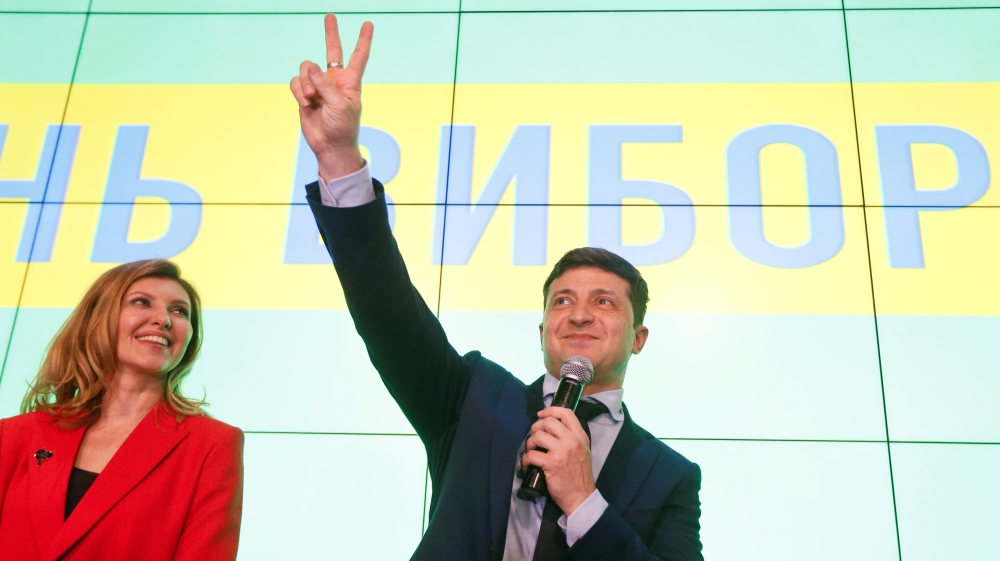
Kiev, Ukraine – Ukraine’s President Petro Poroshenko has accused comic Volodymyr Zelensky, his opponent and the frontrunner in an upcoming presidential vote runoff, of being an oligarch’s puppet.
In a Facebook post published on Monday, Poroshenko linked Zelensky’s success in the polls on Sunday to the work of the “Kremlin agents” and oligarch Ihor Kolomoisky, who owns the TV channel that airs Zelensky’s sitcom series.
“I begin the struggle for winning in the second round,” he declared.
According to the official vote count published by Ukraine’s Central Election Commission (CEC), Zelensky secured about 30 percent of the votes, Poroshenko – about 16 percent.
Voter turnout was above 63 percent, CEC said. The second round runoff is scheduled for April 21.
Many of the Ukrainians who took to social media to react to the election results blamed Poroshenko for his poor showing in the first round.
Ukrainian voters speak ahead of key presidential poll
Yurii Kasyanov, wrote on Facebook: “All the five years of his presidency, [Poroshenko] did everything possible and impossible, did his utmost, worked to the point of disgust, so that the people would vote for anyone, but not for politicians.”
Kasyanov accused the president of “destroying the achievements of Maidan [the anti-government protests that brought him to power].
“It was he who flushed the unprecedented patriotic rise of the first months of the war into the toilet. It was he who built an unprecedented corruption system, earning blood,” he said.
 |
| Zelensky is better known for playing a president in a TV sitcom [Valentyn Ogirenko/Reuters] |
But to many Poroshenko supporters, he seems to be the only guarantor of security.
“Of course, I cannot call Poroshenko an ideal candidate, but if we want to save the sovereignty of our country and guarantee our basic physical security, the choice is clear [in his favour],” Evgeniy Podroiko, 34-year-old IT specialist, told Al Jazeera.
Poroshenko’s chances
Despite his poor showing in the first round, the incumbent president could still overpower his opponent in the runoff, said Volodymyr Fesenko, director of the centre for political studies Penta.
“A large proportion of the candidates who did not make it to the second round represent the opposition and the majority of their supporters will vote for Zelensky in the runoff,” Fesenko told Al Jazeera. “But Poroshenko does still have a chance to win.”
Ukraine election: A unique village laments its historical divide
He said Poroshenko would try to trash Zelensky during the debates he had been avoiding before the first round.
“Poroshenko will try to show that he is better, more competent and prepared whereas Zelensky – weak, inexperienced and not ready for the presidency,” said Fesenko.
Poroshenko’s team will also try scare the Ukrainian voters by saying that Russia will conquer Ukraine under a weak president, he said.
According to Fesenko, Poroshenko’s team could also attempt to secure a low turnout which would help Poroshenko in the second round.
Mixed legacy
The vote on Sunday was the first since the so-called Revolution of Dignity brought Poroshenko to power five years ago.
The 53-year-old, who was elected with almost 55 percent of vote in 2014, seems to have failed to rally his electorate despite his efforts to be seen as a passionate defender of the country’s territorial unity, as well as the champion of the goal of joining the EU and NATO.
During his time in office, Poroshenko reinforced the country’s army and ratified the Association Agreement with the EU, the document that enabled Ukrainians to trade with and travel to Europe without restrictions.
Kharkiv’s pro-Russian protesters still mistrustful of Kiev
The incumbent president also secured the independence of Ukraine’s Orthodox Church from its Russian counterpart.
But he failed to rid the country of corruption, or recover money stolen from Ukraine’s coffers before he came to power.
The elections took place against a backdrop of a war that has killed more than 13,000 people in Ukraine’s eastern Donetsk and Luhansk regions, with government forces fighting Russia-backed separatists.
The conflict followed Russia’s annexation of Crimea in 2014 which in turn came after the ousting of Moscow-backed leader Viktor Yanukovich earlier that year.
Several million of the approximately 35 million eligible voters were unable or unwilling to cast their ballots in the occupied territories.
Follow Al Jazeera’s Tamila Varshalomidze on Twitter @tamila87v












